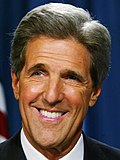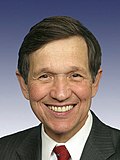The 1856 Democratic National Convention was a presidential nominating convention that met from June 2 to June 6 in Cincinnati, Ohio. It was held to nominate the Democratic Party's candidates for president and vice president in the 1856 election. The convention selected former Secretary of State James Buchanan of Pennsylvania for president and former Representative John C. Breckinridge of Kentucky for vice president.

The Missouri bellwether was a political phenomenon that noted that the state of Missouri voted for the winner in all but one U.S. presidential election from 1904 to 2004. While states like Pennsylvania, Nevada, Florida and Wisconsin have been arguably stronger indicators of political trends in recent years, Missouri was a consistent swing state throughout the 20th century. Prior to the 2008 elections, Lincoln County, Missouri was said to be the only bellwether county in a bellwether state. Missouri was also considered a bellwether of U.S. views on hot-button social issues such as stem cell research and school vouchers. Some economists also considered the state a bellwether for economic trends such as consumer confidence and unemployment.

The 2004 United States presidential election in Kansas took place on November 2, 2004 as part of the 2004 United States presidential election. Voters chose six representatives, or electors to the Electoral College, who voted for president and vice president.

The 2008 United States presidential election in Missouri was held on November 4, 2008, and was part of the 2008 United States presidential election, which took place throughout all 50 states and D.C. Voters chose 11 representatives, or electors to the Electoral College, who voted for president and vice president.

The 1936 United States presidential election in California was held on November 3, 1936, as part of the 1936 United States presidential election. State voters chose twenty-two electors, or representatives to the Electoral College, who voted for president and vice president.

The 1856 United States presidential election in California took place on November 4, 1856, as part of the 1856 United States presidential election. Voters chose four representatives, or electors to the Electoral College, who voted for president and vice president. California voted for the Democratic nominee, former Secretary of State James Buchanan, over the American Party nominee, former Whig President Millard Fillmore, and the Republican nominee, former U.S. Senator and Military Governor of California John C. Frémont.
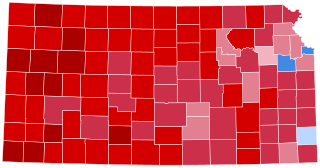
The 2008 United States presidential election in Kansas took place on November 4, 2008, and was part of the 2008 United States presidential election. Voters chose six representatives, or electors to the Electoral College, who voted for president and vice president.

The 1936 United States presidential election in Pennsylvania took place on November 3, 1936 as part of the 1936 United States presidential election. Voters chose 36 representatives, or electors to the Electoral College, who voted for president and vice president.

The 2012 United States presidential election in Kansas took place on November 6, 2012, as part of the 2012 United States presidential election in which all 50 states plus the District of Columbia participated. Kansas voters chose six electors to represent them in the Electoral College via a popular vote pitting incumbent Democratic President Barack Obama and his running mate, Vice President Joe Biden, against Republican challenger and former Massachusetts Governor Mitt Romney and his running mate, Congressman Paul Ryan. Romney and Ryan carried the state with 59.59 percent of the popular vote to Obama's and Biden's 38.00 percent, thus winning the state's six electoral votes.

The 1932 United States presidential election in Vermont took place on November 8, 1932, as part of the 1932 United States presidential election which was held throughout all contemporary 48 states. Voters chose three representatives, or electors to the Electoral College, who voted for president and vice president.

The 1928 United States presidential election in Vermont took place on November 6, 1928, as part of the 1928 United States presidential election which was held throughout all contemporary 48 states. Voters chose four representatives, or electors to the Electoral College, who voted for president and vice president.

The 2016 United States presidential election in Kansas was held on Tuesday, November 8, 2016, as part of the 2016 United States presidential election in which all 50 states and the District of Columbia participated. Kansas voters chose electors to represent them in the Electoral College via a popular vote, pitting the Republican Party's nominee, businessman Donald Trump, and running mate Indiana Governor Mike Pence against Democratic Party nominee, former Secretary of State Hillary Clinton, and her running mate Virginia Senator Tim Kaine. Kansas has six electoral votes in the Electoral College.

The 2016 Kansas Democratic presidential caucuses took place on March 5 in the U.S. state of Kansas as one of the Democratic Party's primaries ahead of the 2016 presidential election.

The 1912 United States presidential election in Kansas took place on November 5, 1912, as part of the 1912 United States presidential election. Voters chose ten representatives, or electors, to the Electoral College, who voted for president and vice president.

The 1896 United States presidential election in Kansas took place on November 3, 1896. All contemporary 45 states were part of the 1896 United States presidential election. Kansas voters chose ten electors to the Electoral College, which selected the president and vice president.

The 1932 United States presidential election in Kansas was held on November 8, 1932 as part of the 1932 United States presidential election held throughout all forty-eight contemporary states. State voters chose nine electors, or representatives to the Electoral College, who voted for President and Vice-President.
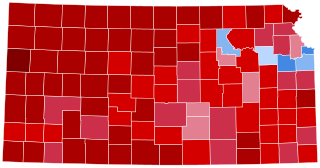
The 2020 United States presidential election in Kansas was held on Tuesday, November 3, 2020, as part of the 2020 United States presidential election in which all 50 states plus the District of Columbia participated. Kansas voters chose electors to represent them in the Electoral College via a popular vote, pitting the Republican Party's nominee, incumbent President Donald Trump of Florida, and running mate Vice President Mike Pence of Indiana against Democratic Party nominee, former Vice President Joe Biden of Delaware, and his running mate Senator Kamala Harris of California. Kansas has six electoral votes in the Electoral College.

The 2020 Kansas Democratic presidential primary took place until May 2, 2020, in the Democratic Party primaries for the 2020 presidential election, as in-person voting had been cancelled because of the COVID-19 pandemic. The Kansas primary was a closed party-run primary, undertaken completely by mail-in voting, it was the sole contest held on that date. The state awarded 45 delegates to the 2020 Democratic National Convention, of which 39 were pledged delegates allocated on the basis of the results of the primary. Voters cast ranked choice voting ballots, with a voter's ballot counting for four ranked backup choices if their original choice was in last place and below the 15 percent threshold for winning delegates.

The 1916 United States presidential election in Kansas was held on November 7, 1916. Kansas voters chose ten electors to the Electoral College, who voted for president and vice president.
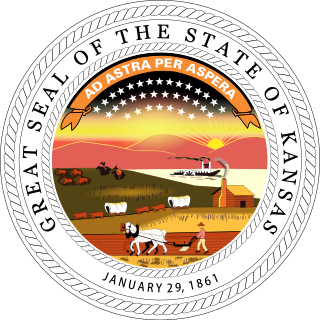
The 2024 United States presidential election in Kansas is scheduled to take place on Tuesday, November 5, 2024, as part of the 2024 United States elections in which all 50 states plus the District of Columbia will participate. Kansas voters will choose electors to represent them in the Electoral College via a popular vote. The state of Kansas has six electoral votes in the Electoral College, following reapportionment due to the 2020 United States census in which the state neither gained nor lost a seat.

